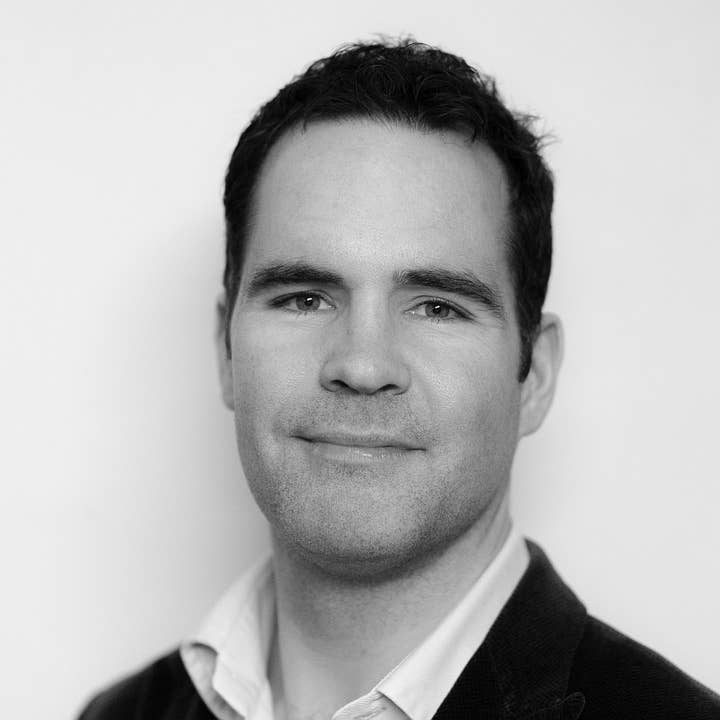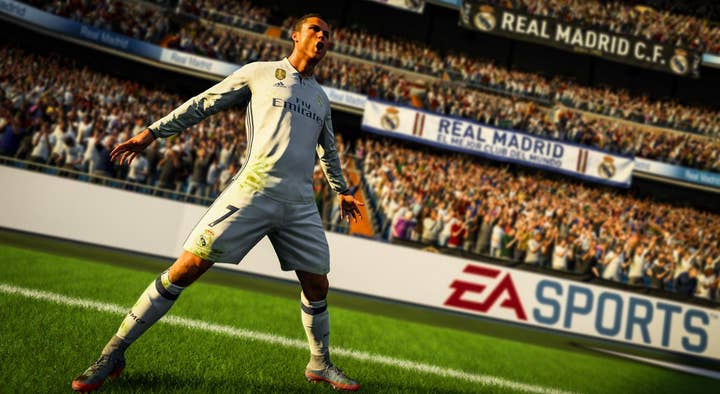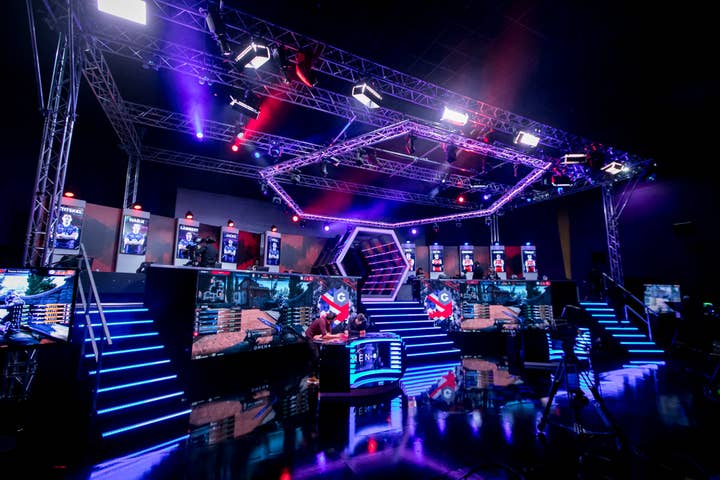Gfinity: "We're getting ready for when the esports revenue finally takes off"
Esports firm discusses its Elite series, why it's partnering with EA and getting ready for the inevitable esports revenue
Gfinity is an intriguing esports business.
Based in the UK - not a market renown for its strong competitive gaming scene - the company is listed on the UK stock exchange, and even operates its own arena out of a cinema in London.
The company has certainly made an impact. Its tournaments attract decent viewerships and teams, it partners with major games (its latest deal is with FIFA), and operates tournaments on behalf of big partners, like Gillette, Virgin and F1. Its broadcasts have even appeared on [UK TV channels] BBC Three and BT Sport.

Its revenues keep growing, too. In it latest financial year report, revenue has risen 64% to just under £2.4 million. However, not everything is increasing in the right direction. During its last financial year, losses reached £5.3 million, up from £3.1 million the year before.
"Obviously, creating shareholder value is a core focus of ours," says chief strategy officer Bryan Healy. "It is what we need to do. As we expand globally, we will need to raise more funding. We are very focused on that. From a revenue perspective, we want to be aggressive. Esports is exploding globally and we've got ourselves into a leadership position, so we are going to be very aggressive.
"As we continue to generate more revenue, we will continue to invest that in growth. We are lucky in the sense that the vast majority of shareholders understand that. They understand that it is a very nascent business, and everybody out there is rushing to state their claim. What we are doing is positioning ourselves as a leader ahead of the revenue streams that are expected to come.
"What we are doing is positioning ourselves as a leader ahead of the revenue streams that are expected to come"
"Take sponsorship - which is just one revenue stream - we are now starting to see non-endemic brands come into this space in a much bigger way. Like Coca-Cola, American Express, Red Bull, McDonalds... that's a really positive sign. It's not surprising to see that, but the question is when are we going to see that tipping point where the leaders in space, not just Gfinity, are going to finally see the revenue take off? When are we going to see more of these non-endemic brands come in in a big way? If you look at the sponsorship revenue in traditional sport - whether that's Rugby or the Premier League or F1 - you can see unbelievable revenue. Of course, those are very developed sports and so it's still a long way off for esports. But it is coming."
Healy suggests it's important to focus on the growth rather than the profitability at this stage, especially with the sheer number of competitors fighting for attention. Not all of them can be expected to survive.
"You might see some consolidation in esports over the next three or five years," he says. "Because right now everyone is jumping in - left, right, centre, they're coming from all directions. There is only so big a pool, right? As Gfinity, we want to be in a leadership position in three to five years when that thinning out happens, and you see the quality rise to the top. If you are in a leadership position when that happens, you know the revenue streams are going to come. And we think we will be very well positioned to take advantage of them."
Gfinity's strategy is focused on two main areas. The first is the partnerships it has with companies like F1 and Gillette. These partnerships sit in a separate silo of the business, and remain a key focus for Gfinity as other sports brands and corporate firms try to carve out a niche in esports.
The other area is its more public-facing efforts, headlined by its Elite series, but also including its semi-pro Challenger series, and its standalone tournaments around specific games (such as Counter-Strike: Global Offensive).
The Elite series is a live event format, with a focus on a handful of key games. The first season started in June last year, which attracted 3.3 million viewers. The second season followed shortly afterwards and has pulled in over five million viewers.
Season 3 is just about to begin. It will include the games Street Fighter V and Rocket League, plus - following a deal with EA - FIFA 18 for the first time.

"FIFA is important to us from a few different perspectives," Healy explains. "One, it is one of the most played games in the world.
"From a distribution stand-point in terms of the Elite series, one of the things we have done is create a product that we can bring to a broader audience, besides just the hardcore gamers on Twitch. That wasn't the sole factor in the selection of the games we use, but certainly part of it. So for season 3, we will have Street Fighter, Rocket League and then FIFA. If you talk about different platforms - for example like BT Sport - we think FIFA will resonate with a much broader audience, a more casual audience if you will.
"Even if you're not a huge FIFA 18 player, if you come across the Elite series on BT Sport or some of these other channels, then your chance of engaging with it might be a bit higher than with some of these other games."
The growth is clear to see, yet the Elite series still remains small compared with some of its competitors.
"Obviously we stated this with a long-term vision, where we will spend three to five years of building this thing into a premier competition that would operate around the world in different territories," he says. "So this is very early days. It's roughly six months in so far. And that's just the UK. We don't do the kind of viewership that you see from some of these giant tournaments around the world, where they bring in the top teams like Cloud9. They are being flown in by the big organisers. That's great, but the numbers are mostly driven by the teams. We knew we would never achieve those viewership numbers at the start, but that was fine as we always had a long view that we would build it into one of the biggest tournaments in the world. We just need to grow it from season to season."
Gfinity is working with partners to deliver Elite around the world, including Here, There and Everywhere (HT&E) in Australia, with further partnerships in the works for South America, North America, other European countries and maybe even Asia.
It's also recently acquired CeVO, a North American business which works with various esports leagues in relation to the video game Counter-Strike. CeVO has its own proprietary technology and platform, including broadcasting and anti-cheat systems, which was certainly part of the reason Gfinity bought them. But it also widens the company's international reach.

This is important, because Gfinity's HQ is based in the UK, one of the least developed esports markets. Competitive gaming is growing in Britain, but at a slow pace. Regardless, Healy says the firm is still committed to its UK efforts.
"UK esports - whether that's engagement or viewership or whatever - is a bit behind some other countries," he acknowledges. "But that's not necessarily a negative thing, because the potential in the UK is still fantastic. There's a lot of opportunity, long-term, to make the UK one of the premier esports markets in the world. Nothing is changing from our commitment to this market. The UK Elite series is not going away, and we are going to keep growing this thing. Even if we were to launch in Germany or Italy, it wouldn't be a case of reducing the UK to do it.
"There's a lot of opportunity, long-term, to make the UK one of the premier esports markets in the world"
"In terms of the US market, that's an obvious one for us. It's very developed from an esports perspective, it is very engaged from a participation and viewership perspective. And obviously in terms of growth, it is a massive market. So it's very important to get in there.
"The UK might be a bit behind that, but it has massive potential. And that's exciting, because we've put ourselves in a leadership position with the Elite series. Right down to the semi-professionals, we have done well digging down into the lower groups and giving them a concrete pathway into a professional environment. We will keep building up the Challenger Series as well, and hopefully get more people engaged. We want to build out this semi-pro and amateur environment. Because that is going to fuel the UK in the long-term."
Gfinity is bullish on the inevitability that esports will prove a highly profitable industry, if not for everyone, certainly for those towards the top of the chain. A position that Gfinity believes it holds, and will continue to do so.
In the mean time, it's the company's job to grow the audience, grow the revenues, but also to help legitimise esports. Indeed, Healy believes that the biggest short-term change we're seeing in esports right now is its increased professionalism.
"You can see that in player management, content production, marketing, media rights, sponsorship... all of those different aspects of esports, which are quite similar to the traditional silos in traditional sport," he concludes. "All of those things are continuing to develop and it's attracting more and more elite-level people to that. It's attracting people from the entertainment business, the sports business, big athletes are coming in behind these teams. From an investment standpoint, you are getting some very savvy investors coming into this space now. So with that, I think the professionalism of esports is going to rapidly grow and expand.
"If you look at player contracts now. Two years ago, they were very loose. These teams were signing these contracts where players can just jump ship and change teams quickly. Now you are seeing those contracts becoming much tighter and more like a professional athlete in a traditional sport. That's because the salaries being demanded, and the investment coming in, is so large. People are investing seven figures in some of these teams, and so if that team is going to spend significant money acquiring players, then they need to protect that investment, so we're seeing contracts that are similar to what a player at Chelsea might sign.
"That is something we are already coaching our teams in the Elite series. We're telling them that if they're signing players, they want to protect their investment.
"As big non-endemic brands come into this space, they're much more demanding than some of the gaming brands. Like a McDonalds, it has a professional structure in terms of where they invest their money and what they want out of it. So the teams, or leagues, or anybody, will have to adapt to deliver for these big international global brands, who will be very specific in terms of what they want.
"That's my biggest thing for the next 12 months. You are going to see the continued increase in quality and professionalism of esports."








